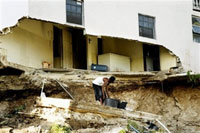Powerful earthquake shakes eastern Caribbean
A strong earthquake rattled the eastern Caribbean. Dozens of buildings were destroyed, some people were injured when they jumped from the windows.

The magnitude-7.4 earthquake was centered 14 miles (23 kilometers) northwest of Martinique's coastline and lasted longer than 20 seconds. It collapsed the roofs of a bank and a store in the capital of this French island and left cracks in several other buildings.
"My house shook so hard I thought it was going to fall," said a caller to Radio Martinique who identified herself only as Fannie. "The door, the windows, everything shook."
The Pacific Tsunami Warning Center in Hawaii said the quake was too deep to generate a destructive tsunami.
In Martinique, police and firefighters responded to hundreds of calls for help but only minor injuries were reported, said an official who declined to give his name in accordance with government policy. One British citizen died from heart failure during the quake, according to the island's civil security office.
More than 31,000 people on the island of 400,000 were without power Thursday evening, officials said. Many lingered outdoors for hours, fearing aftershocks.
The quake slightly damaged some homes and water pipes in St. Lucia, St. Vincent and other nearby islands. The quake struck at 2 p.m. EST (1900 GMT) and was felt as far away as Puerto Rico to the west, and Venezuela and Suriname to the south.
Experts said the depth of the quake, at 90 miles (145 kilometers), spared the region severe destruction.
"I wouldn't expect major damage because the quake has some depth," said Don Blakeman, a geophysicist at the National Earthquake Information Center in Golden, Colorado.
Scientists at the Seismic Research Unit at the University of the West Indies in Trinidad said the quake was the second-strongest since the unit began monitoring the movements of the Caribbean tectonic plate in 1952. The biggest was a 7.5 temblor recorded in 1974, according to unit seismologist Roderick Stewart.
In Martinique, six people were injured when they jumped through windows, including one in serious condition, said Samuel Bernes, a civil security office spokesman. Others were slightly injured when they tried to flee their homes, and dozens were treated for panic attacks, officials said.
Government officials announced schools will be closed Friday and that some roads on the northern end of the island were cracked and impassable.
In Barbados, a woman was trampled as workers fled an office building in Bridgetown, the capital, and was hospitalized in stable condition. Another woman broke her leg while trying to rush out of her home, according to a police report.
In Trinidad, the shaking sent workers streaming out of office towers into the streets of the capital, Port-of-Spain.
Flights at St. Maarten's Princess Juliana International Airport were briefly suspended. In Guyana, lawmakers evacuated the South American country's parliament building.
The earthquake did not disrupt production at Trinidad's state-owned oil refinery, Petrotrin, which produces 160,000 barrels of refined gasoline, diesel and oil daily for domestic use and export to countries including the United States.
"We have not had any reports about breakdowns from our exploration and production fields," spokesman Arnold Corneal said. "We are still doing checks."
The temblor triggered a series of false quake alarms in California, with computers picking up energy coming out of the Caribbean and erroneously treating it as local seismic activity, scientists at the U.S. Geological Survey said.
Subscribe to Pravda.Ru Telegram channel, Facebook, RSS!





